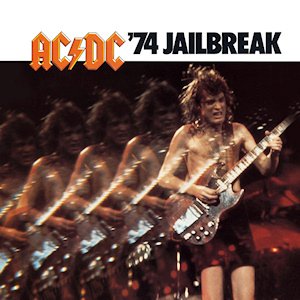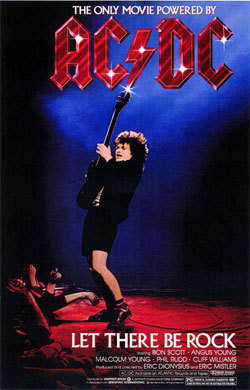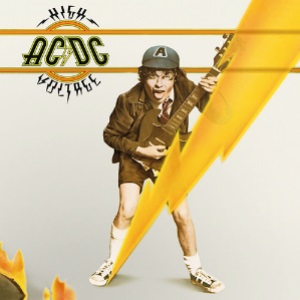
AC/DC are an Australian rock band formed in 1973. They were founded by brothers Malcolm Young on rhythm guitar and Angus Young on lead guitar. Their current lineup comprises Angus, bassist Cliff Williams, drummer Phil Rudd, lead vocalist Brian Johnson, and rhythm guitarist Stevie Young, nephew of Angus and Malcolm. Their music has been variously described as hard rock, blues rock, and heavy metal, but the band calls it simply "rock and roll". They are cited as a formative influence on the new wave of British heavy metal bands, such as Def Leppard and Saxon. AC/DC were inducted into the Rock and Roll Hall of Fame in 2003.

Ronald Belford "Bon" Scott was an Australian singer and songwriter. He was the second lead vocalist and lyricist of the hard rock band AC/DC from 1974 until his death in 1980.

Angus McKinnon Young is an Australian musician, best known as the co-founder, lead guitarist, songwriter, and the only remaining founding member of the hard rock band AC/DC. He is known for his energetic performances, schoolboy-uniform stage outfits and his own version of Chuck Berry's duckwalk. Young was ranked 38th in the 2023 edition of Rolling Stone's 250 greatest guitarists of all-time list. In 2003, Young and the other members of AC/DC were inducted into the Rock and Roll Hall of Fame.

"Dog Eat Dog" is a song by Australian hard rock band AC/DC. It is the second track of their album Let There Be Rock, released in 1977, and was written by Angus Young, Malcolm Young, and Bon Scott.

Powerage is the fifth studio album by Australian hard rock band AC/DC, released in 1978. This was the band's first album to feature Cliff Williams on bass guitar, and it was also the first AC/DC album not to have a title track and the first worldwide not to be released with a different album cover. Powerage was re-released in 2003 as part of the AC/DC Remasters series.

If You Want Blood You've Got It is the first live album by Australian hard rock band AC/DC, and their only live album released during Bon Scott's lifetime. It was originally released in the UK and Europe on 13 October 1978, in the US on 21 November 1978, and in Australia on 27 November 1978. The album was re-released in 1994 on Atco Records and in 2003 as part of the AC/DC Remasters series.

'74 Jailbreak is the only EP by Australian rock band AC/DC, released in 1984. It is composed of five tracks that had previously been released only in Australia. Despite the EP's title, the song "Jailbreak" was actually recorded in 1976 and was originally released that year on the Australian version of the Dirty Deeds Done Dirt Cheap album. The EP's four other tracks were originally released on the Australian version of the band's debut album, High Voltage, recorded in 1974 and released early the following year.

Mark Whitmore Evans is an Australian musician, the current bass guitarist for rock band Rose Tattoo, and also a member of hard rock band AC/DC from March 1975 to June 1977. His playing featured on their albums T.N.T, High Voltage, Dirty Deeds Done Dirt Cheap and Let There Be Rock. Evans has played for numerous other groups, sometimes on lead guitar, including Finch, Cheetah, Swanee, Heaven and The Party Boys. Evans' autobiography, Dirty Deeds: My Life Inside/Outside of AC/DC was released in December 2011.

Let There Be Rock: The Movie – Live in Paris is a live double album by the hard rock band AC/DC, released as "Disc Two" and "Disc Three" of the Bonfire box set in 1997. It is also the soundtrack to the film AC/DC: Let There Be Rock. It is the last album Bon Scott recorded with the band before he died, just two months before his death and was released posthumously.

Volts is an album by AC/DC released as a part named "Disc Four" on the Bonfire box set. Released in November 1997, the album is a compilation of some alternative versions of songs recorded for the albums Let There Be Rock and Highway to Hell, and some songs previously released.

"It's a Long Way to the Top (If You Wanna Rock 'n' Roll)" is a song by Australian hard rock band AC/DC. It is the first track of the group's second album T.N.T., released only in Australia and New Zealand on 8 December 1975, and was written by Angus Young, Malcolm Young and Bon Scott. The song combines bagpipes with hard rock instrumentation; in the middle section of the song there is a call and response between the bagpipes and guitar. The original recording is in B-flat major, but it was played live in A major.

"Dirty Deeds Done Dirt Cheap" is a hard rock song by the Australian band AC/DC. Written by group members Angus Young, Malcolm Young, and Bon Scott, it was recorded for the title track of their album Dirty Deeds Done Dirt Cheap, released in September 1976.

AC/DC: Let There Be Rock is a 1980 concert film featuring the Australian hard rock band AC/DC, released theatrically in September 1980 and on videotape the same year.

"Rock 'n' Roll Damnation" is a single by the Australian rock band AC/DC, and the first track on their Powerage album, released in 1978. The single version is an abbreviated version of the album track, with a time of 3:05, as opposed to the album track's length of 3:37. The album track "Sin City" was the B-side in the UK, Germany, Belgium, and Japan. In the US, Canada, and the Netherlands, it was "Kicked in the Teeth," also from the album. In Australia, however, the B-side was "Cold Hearted Man," which appeared on initial UK and European pressings of the album, and was eventually removed when "Rock 'n' Roll Damnation" was added.

"High Voltage" is a song by Australian hard rock band AC/DC. It was first released in Australia as a single in July 1975, though it is the eighth track of their second Australian album T.N.T., the release itself was issued as a stand alone single. The song was written by Angus Young, Malcolm Young and Bon Scott, and peaked at #48 on the UK Singles Chart in 1980.

"Can I Sit Next to You, Girl" is the debut single by Australian hard rock band AC/DC, issued on 22 July 1974. On 26 August 1974, the song peaked at number 50 in Australia. This version has lead vocals performed by Dave Evans prior to his being replaced by Bon Scott, as well as drums by ex-Masters Apprentices member Colin Burgess, and bass guitar by ex-The Easybeats member George Young. Originally, AC/DC's first bassist, Larry Van Kriedt, played the bass parts, but George recorded his own over them later. In 1975, after Scott joined, the group re-arranged and re-recorded the song as the seventh track on their Australia-only album T.N.T., released in December 1975, and as the sixth track on the international version of High Voltage, released in May 1976. The title of this version of the song removed the comma, becoming "Can I Sit Next To You Girl".

Dirty Deeds Done Dirt Cheap is the third studio album by Australian hard rock band AC/DC, originally released only in Europe, Australia and New Zealand in 1976. The album was not released in the United States until 1981, more than one year after lead singer Bon Scott's death. This was also AC/DC's first album in its entirety to be recorded with the same lineup, rather than including at least one track recorded with a different bassist or drummer.

High Voltage is the first internationally released album by Australian hard rock band AC/DC. It contains tracks completed from their first two previous Australia-only issued albums, High Voltage and T.N.T..

High Voltage is the debut studio album by Australian hard rock band AC/DC, released only in Australia and New Zealand, on 17 February 1975. Their first international release in 1976 would also be named High Voltage, though with a radically different track list.

Backtracks is a box set by Australian hard rock band AC/DC. It was announced on 29 September 2009 and was released on 10 November 2009. This is a collection of the band's studio and live rarities together in one boxset. There are two editions; a Deluxe Edition and a Standard Edition. All tracks have been remastered to match the sound of the 2003 album remasters and many songs appear on CD for the first time. It is the band's second box set of rarities, following the Bonfire release in 1997.


















